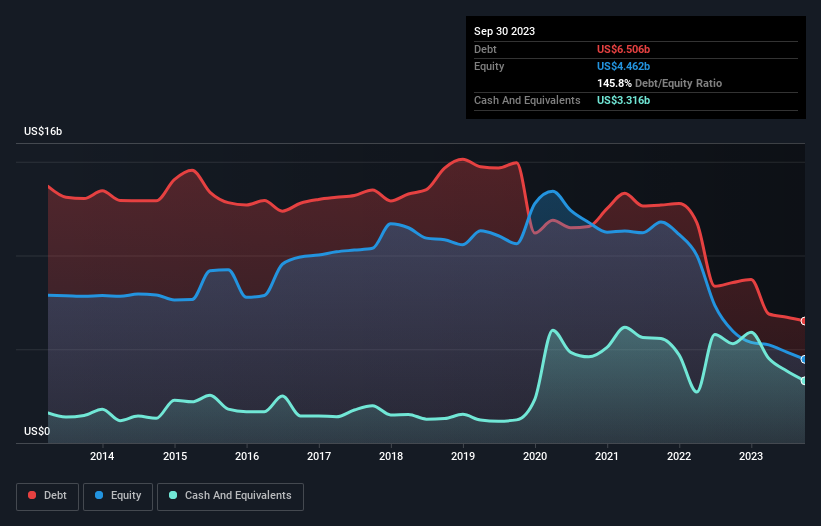- United States
- /
- Hospitality
- /
- NYSE:MGM
We Think MGM Resorts International (NYSE:MGM) Is Taking Some Risk With Its Debt

David Iben put it well when he said, 'Volatility is not a risk we care about. What we care about is avoiding the permanent loss of capital.' So it seems the smart money knows that debt - which is usually involved in bankruptcies - is a very important factor, when you assess how risky a company is. As with many other companies MGM Resorts International (NYSE:MGM) makes use of debt. But the real question is whether this debt is making the company risky.
When Is Debt Dangerous?
Generally speaking, debt only becomes a real problem when a company can't easily pay it off, either by raising capital or with its own cash flow. In the worst case scenario, a company can go bankrupt if it cannot pay its creditors. However, a more usual (but still expensive) situation is where a company must dilute shareholders at a cheap share price simply to get debt under control. Of course, plenty of companies use debt to fund growth, without any negative consequences. The first step when considering a company's debt levels is to consider its cash and debt together.
View our latest analysis for MGM Resorts International
What Is MGM Resorts International's Net Debt?
As you can see below, MGM Resorts International had US$6.51b of debt at September 2023, down from US$8.56b a year prior. However, it does have US$3.32b in cash offsetting this, leading to net debt of about US$3.19b.

How Strong Is MGM Resorts International's Balance Sheet?
Zooming in on the latest balance sheet data, we can see that MGM Resorts International had liabilities of US$2.96b due within 12 months and liabilities of US$35.1b due beyond that. Offsetting these obligations, it had cash of US$3.32b as well as receivables valued at US$972.0m due within 12 months. So its liabilities outweigh the sum of its cash and (near-term) receivables by US$33.8b.
This deficit casts a shadow over the US$15.3b company, like a colossus towering over mere mortals. So we'd watch its balance sheet closely, without a doubt. At the end of the day, MGM Resorts International would probably need a major re-capitalization if its creditors were to demand repayment.
We measure a company's debt load relative to its earnings power by looking at its net debt divided by its earnings before interest, tax, depreciation, and amortization (EBITDA) and by calculating how easily its earnings before interest and tax (EBIT) cover its interest expense (interest cover). Thus we consider debt relative to earnings both with and without depreciation and amortization expenses.
Given net debt is only 1.5 times EBITDA, it is initially surprising to see that MGM Resorts International's EBIT has low interest coverage of 0.34 times. So while we're not necessarily alarmed we think that its debt is far from trivial. Notably, MGM Resorts International made a loss at the EBIT level, last year, but improved that to positive EBIT of US$140m in the last twelve months. The balance sheet is clearly the area to focus on when you are analysing debt. But ultimately the future profitability of the business will decide if MGM Resorts International can strengthen its balance sheet over time. So if you're focused on the future you can check out this free report showing analyst profit forecasts.
Finally, while the tax-man may adore accounting profits, lenders only accept cold hard cash. So it's worth checking how much of the earnings before interest and tax (EBIT) is backed by free cash flow. Happily for any shareholders, MGM Resorts International actually produced more free cash flow than EBIT over the last year. There's nothing better than incoming cash when it comes to staying in your lenders' good graces.
Our View
To be frank both MGM Resorts International's interest cover and its track record of staying on top of its total liabilities make us rather uncomfortable with its debt levels. But on the bright side, its conversion of EBIT to free cash flow is a good sign, and makes us more optimistic. Once we consider all the factors above, together, it seems to us that MGM Resorts International's debt is making it a bit risky. That's not necessarily a bad thing, but we'd generally feel more comfortable with less leverage. There's no doubt that we learn most about debt from the balance sheet. However, not all investment risk resides within the balance sheet - far from it. These risks can be hard to spot. Every company has them, and we've spotted 4 warning signs for MGM Resorts International (of which 2 are potentially serious!) you should know about.
At the end of the day, it's often better to focus on companies that are free from net debt. You can access our special list of such companies (all with a track record of profit growth). It's free.
New: Manage All Your Stock Portfolios in One Place
We've created the ultimate portfolio companion for stock investors, and it's free.
• Connect an unlimited number of Portfolios and see your total in one currency
• Be alerted to new Warning Signs or Risks via email or mobile
• Track the Fair Value of your stocks
Have feedback on this article? Concerned about the content? Get in touch with us directly. Alternatively, email editorial-team (at) simplywallst.com.
This article by Simply Wall St is general in nature. We provide commentary based on historical data and analyst forecasts only using an unbiased methodology and our articles are not intended to be financial advice. It does not constitute a recommendation to buy or sell any stock, and does not take account of your objectives, or your financial situation. We aim to bring you long-term focused analysis driven by fundamental data. Note that our analysis may not factor in the latest price-sensitive company announcements or qualitative material. Simply Wall St has no position in any stocks mentioned.
About NYSE:MGM
MGM Resorts International
Through its subsidiaries, owns and operates casino, hotel, and entertainment resorts in the United States and internationally.
Very undervalued with mediocre balance sheet.
Similar Companies
Market Insights
Community Narratives




